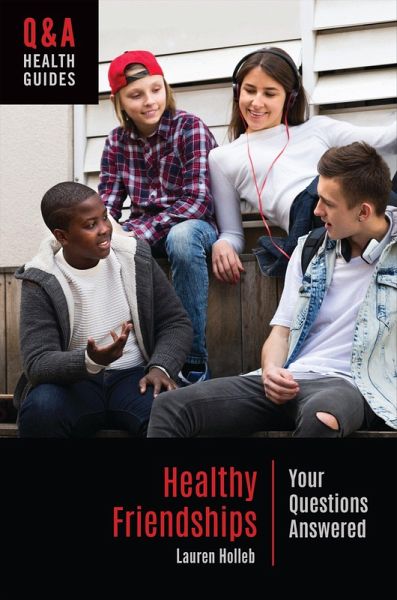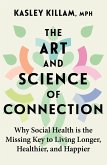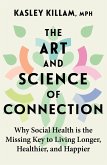- Broschiertes Buch
- Merkliste
- Auf die Merkliste
- Bewerten Bewerten
- Teilen
- Produkt teilen
- Produkterinnerung
- Produkterinnerung
This accessible book explores what friendship is and why it's so important to our well-being and provides practical suggestions for teens and young adults wishing to experience deeper, more fulfilling connections.
Andere Kunden interessierten sich auch für
![Miss-Connection Miss-Connection]() Justin CoulsonMiss-Connection17,99 €
Justin CoulsonMiss-Connection17,99 €![Friends Are Everything Friends Are Everything]() BJ GallagherFriends Are Everything24,99 €
BJ GallagherFriends Are Everything24,99 €![Red Flags, Green Flags Red Flags, Green Flags]() Dr Ali FenwickRed Flags, Green Flags21,99 €
Dr Ali FenwickRed Flags, Green Flags21,99 €![The Art and Science of Connection The Art and Science of Connection]() Kasley KillamThe Art and Science of Connection23,99 €
Kasley KillamThe Art and Science of Connection23,99 €![The Art and Science of Connection The Art and Science of Connection]() Kasley KillamThe Art and Science of Connection16,99 €
Kasley KillamThe Art and Science of Connection16,99 €![Hold on to Your Kids Hold on to Your Kids]() Gordon NeufeldHold on to Your Kids24,99 €
Gordon NeufeldHold on to Your Kids24,99 €![The Spirit of Intimacy The Spirit of Intimacy]() Sobonfu SomeThe Spirit of Intimacy15,99 €
Sobonfu SomeThe Spirit of Intimacy15,99 €-
-
-
This accessible book explores what friendship is and why it's so important to our well-being and provides practical suggestions for teens and young adults wishing to experience deeper, more fulfilling connections.
Hinweis: Dieser Artikel kann nur an eine deutsche Lieferadresse ausgeliefert werden.
Hinweis: Dieser Artikel kann nur an eine deutsche Lieferadresse ausgeliefert werden.
Produktdetails
- Produktdetails
- Verlag: Bloomsbury Academic
- Seitenzahl: 144
- Erscheinungstermin: 29. Mai 2025
- Englisch
- Abmessung: 235mm x 155mm x 25mm
- Gewicht: 454g
- ISBN-13: 9798765152492
- Artikelnr.: 73258269
- Herstellerkennzeichnung
- Libri GmbH
- Europaallee 1
- 36244 Bad Hersfeld
- gpsr@libri.de
- Verlag: Bloomsbury Academic
- Seitenzahl: 144
- Erscheinungstermin: 29. Mai 2025
- Englisch
- Abmessung: 235mm x 155mm x 25mm
- Gewicht: 454g
- ISBN-13: 9798765152492
- Artikelnr.: 73258269
- Herstellerkennzeichnung
- Libri GmbH
- Europaallee 1
- 36244 Bad Hersfeld
- gpsr@libri.de
Lauren Holleb, PhD, is associate professor of Mental Health and Human Services at the University of Maine at Augusta, USA and a licensed psychologist in part-time private practice.
Series Foreword
Acknowledgments
Introduction
Guide to Health Literacy
Common Misconceptions about Friendship
Questions and Answers
General Information and Definitions
1. What is friendship?
2. How does friendship differ from peer acceptance?
3. So, if you're well-liked by the peer group, does that mean you have good
friends?
4. What are social skills, and how are they important to friendship?
5. What serves as the basis for friendship? How do people become friends?
6. What contributes to high-quality friendship?
Different and Changing Friendships
7. How stable is friendship?
8. How does friendship change during adolescence?
9. How does friendship change during adulthood?
10. In what ways are the friendships of boys/girls and men/women the same,
and how are they different?
11. What are cross-gender friendships like, and when do they typically
form?
12. Why does friendship often change when a friend forms a new romantic
relationship?
13. Can you be friends with people who are different from you?
The Impact of Friendship
14. What are the benefits of friendship?
15. How can having a best friend during adolescence be good for you?
16. Is it possible to have the "wrong" friends or "bad" friends?
17. What is co-rumination, and how can it be bad for you?
18. Is peer pressure always bad?
What to Do as a Friend
19. How can you make friends?
20. What are the best ways to maintain friendships?
21. Is it ever acceptable to break a friend's trust?
22. What should you do if you think a friend has betrayed your trust?
23. What should you do when you disagree or fight with a friend?
24. What can you do if you develop romantic feelings for a friend and they
are not reciprocated? What can you do if your friend develops romantic
feelings for you and you don't feel the same way?
25. How do you know if someone is a true friend?
26. What can you do if you are worried about a friend?
27. What should you do if a friend is making choices that you disagree
with?
28. Why do friends drift apart?
29. How do you know if you should end a friendship?
30. In what ways can you end a friendship respectfully?
Current Trends in Friendship
31. Is having a friend online the same as having a friend in person?
32. How has the Internet and social media changed friendship?
33. Is technology bad for friendship? How can the Internet be helpful for
friendship?
Research on Friendship
34. In what ways is friendship typically studied?
35. How is social acceptance/peer group acceptance studied?
36. What does research tell us about helping those who struggle with
friendship?
Case Studies
Glossary
Directory of Resources
Index
Acknowledgments
Introduction
Guide to Health Literacy
Common Misconceptions about Friendship
Questions and Answers
General Information and Definitions
1. What is friendship?
2. How does friendship differ from peer acceptance?
3. So, if you're well-liked by the peer group, does that mean you have good
friends?
4. What are social skills, and how are they important to friendship?
5. What serves as the basis for friendship? How do people become friends?
6. What contributes to high-quality friendship?
Different and Changing Friendships
7. How stable is friendship?
8. How does friendship change during adolescence?
9. How does friendship change during adulthood?
10. In what ways are the friendships of boys/girls and men/women the same,
and how are they different?
11. What are cross-gender friendships like, and when do they typically
form?
12. Why does friendship often change when a friend forms a new romantic
relationship?
13. Can you be friends with people who are different from you?
The Impact of Friendship
14. What are the benefits of friendship?
15. How can having a best friend during adolescence be good for you?
16. Is it possible to have the "wrong" friends or "bad" friends?
17. What is co-rumination, and how can it be bad for you?
18. Is peer pressure always bad?
What to Do as a Friend
19. How can you make friends?
20. What are the best ways to maintain friendships?
21. Is it ever acceptable to break a friend's trust?
22. What should you do if you think a friend has betrayed your trust?
23. What should you do when you disagree or fight with a friend?
24. What can you do if you develop romantic feelings for a friend and they
are not reciprocated? What can you do if your friend develops romantic
feelings for you and you don't feel the same way?
25. How do you know if someone is a true friend?
26. What can you do if you are worried about a friend?
27. What should you do if a friend is making choices that you disagree
with?
28. Why do friends drift apart?
29. How do you know if you should end a friendship?
30. In what ways can you end a friendship respectfully?
Current Trends in Friendship
31. Is having a friend online the same as having a friend in person?
32. How has the Internet and social media changed friendship?
33. Is technology bad for friendship? How can the Internet be helpful for
friendship?
Research on Friendship
34. In what ways is friendship typically studied?
35. How is social acceptance/peer group acceptance studied?
36. What does research tell us about helping those who struggle with
friendship?
Case Studies
Glossary
Directory of Resources
Index
Series Foreword
Acknowledgments
Introduction
Guide to Health Literacy
Common Misconceptions about Friendship
Questions and Answers
General Information and Definitions
1. What is friendship?
2. How does friendship differ from peer acceptance?
3. So, if you're well-liked by the peer group, does that mean you have good
friends?
4. What are social skills, and how are they important to friendship?
5. What serves as the basis for friendship? How do people become friends?
6. What contributes to high-quality friendship?
Different and Changing Friendships
7. How stable is friendship?
8. How does friendship change during adolescence?
9. How does friendship change during adulthood?
10. In what ways are the friendships of boys/girls and men/women the same,
and how are they different?
11. What are cross-gender friendships like, and when do they typically
form?
12. Why does friendship often change when a friend forms a new romantic
relationship?
13. Can you be friends with people who are different from you?
The Impact of Friendship
14. What are the benefits of friendship?
15. How can having a best friend during adolescence be good for you?
16. Is it possible to have the "wrong" friends or "bad" friends?
17. What is co-rumination, and how can it be bad for you?
18. Is peer pressure always bad?
What to Do as a Friend
19. How can you make friends?
20. What are the best ways to maintain friendships?
21. Is it ever acceptable to break a friend's trust?
22. What should you do if you think a friend has betrayed your trust?
23. What should you do when you disagree or fight with a friend?
24. What can you do if you develop romantic feelings for a friend and they
are not reciprocated? What can you do if your friend develops romantic
feelings for you and you don't feel the same way?
25. How do you know if someone is a true friend?
26. What can you do if you are worried about a friend?
27. What should you do if a friend is making choices that you disagree
with?
28. Why do friends drift apart?
29. How do you know if you should end a friendship?
30. In what ways can you end a friendship respectfully?
Current Trends in Friendship
31. Is having a friend online the same as having a friend in person?
32. How has the Internet and social media changed friendship?
33. Is technology bad for friendship? How can the Internet be helpful for
friendship?
Research on Friendship
34. In what ways is friendship typically studied?
35. How is social acceptance/peer group acceptance studied?
36. What does research tell us about helping those who struggle with
friendship?
Case Studies
Glossary
Directory of Resources
Index
Acknowledgments
Introduction
Guide to Health Literacy
Common Misconceptions about Friendship
Questions and Answers
General Information and Definitions
1. What is friendship?
2. How does friendship differ from peer acceptance?
3. So, if you're well-liked by the peer group, does that mean you have good
friends?
4. What are social skills, and how are they important to friendship?
5. What serves as the basis for friendship? How do people become friends?
6. What contributes to high-quality friendship?
Different and Changing Friendships
7. How stable is friendship?
8. How does friendship change during adolescence?
9. How does friendship change during adulthood?
10. In what ways are the friendships of boys/girls and men/women the same,
and how are they different?
11. What are cross-gender friendships like, and when do they typically
form?
12. Why does friendship often change when a friend forms a new romantic
relationship?
13. Can you be friends with people who are different from you?
The Impact of Friendship
14. What are the benefits of friendship?
15. How can having a best friend during adolescence be good for you?
16. Is it possible to have the "wrong" friends or "bad" friends?
17. What is co-rumination, and how can it be bad for you?
18. Is peer pressure always bad?
What to Do as a Friend
19. How can you make friends?
20. What are the best ways to maintain friendships?
21. Is it ever acceptable to break a friend's trust?
22. What should you do if you think a friend has betrayed your trust?
23. What should you do when you disagree or fight with a friend?
24. What can you do if you develop romantic feelings for a friend and they
are not reciprocated? What can you do if your friend develops romantic
feelings for you and you don't feel the same way?
25. How do you know if someone is a true friend?
26. What can you do if you are worried about a friend?
27. What should you do if a friend is making choices that you disagree
with?
28. Why do friends drift apart?
29. How do you know if you should end a friendship?
30. In what ways can you end a friendship respectfully?
Current Trends in Friendship
31. Is having a friend online the same as having a friend in person?
32. How has the Internet and social media changed friendship?
33. Is technology bad for friendship? How can the Internet be helpful for
friendship?
Research on Friendship
34. In what ways is friendship typically studied?
35. How is social acceptance/peer group acceptance studied?
36. What does research tell us about helping those who struggle with
friendship?
Case Studies
Glossary
Directory of Resources
Index








